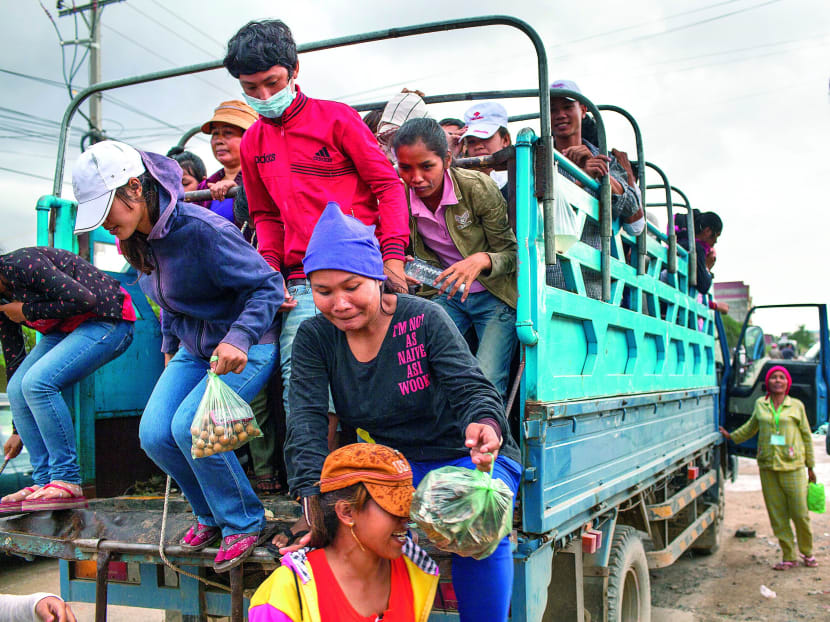Cambodian factories grapple with underage worker issue
SIHANOUKVILLE (Cambodia) — In a quiet Cambodian beach town, Ms Lim Loeung says she spends up to 80 hours a week gluing soles onto shoes at a factory which produces branded footwear for global names. Although the factory believes she is at least 18 years old, her birth records show she will soon turn 15.

Workers alighting from a truck in a garment manufacturing district in Phnom Penh. Cambodia has ratified UN conventions designed to keep teens under age 18 from hazardous work, but the definitions of hazards are not always clear. Photo: Bloomberg
SIHANOUKVILLE (Cambodia) — In a quiet Cambodian beach town, Ms Lim Loeung says she spends up to 80 hours a week gluing soles onto shoes at a factory which produces branded footwear for global names. Although the factory believes she is at least 18 years old, her birth records show she will soon turn 15.
Ms Lim said that at her job interview, a factory employee wrote an earlier birth year on her paperwork than the one indicated on the birth record she presented. “If they see our age is younger, they will not choose us,” she added.
A growing number of Cambodian teenagers are leaving their families to work in factories far from home — sometimes for as many as 80 hours a week.
Cambodia, a poor South-east Asian country, burst onto the global garment scene in the 1990s when its leaders looked to create jobs after years of civil war.
In the first 10 months of this year, the value of the country’s garment exports rose 20 per cent to US$4.61 billion (S$5.85 billion) over the previous year, according to the Commerce Ministry. The rapid growth makes it harder to find enough workers and the increase in global demand has fuelled unhappiness over working conditions.
Ms Lim is part of a team that makes 550 pairs of shoes a day and works in the glue section. The smell “chokes” her, she says. Asked why she made the decision to join the factory, she said: “I wanted to help my family.”
Her family lives in a wooden hut on stilts in the countryside. They have no toilet or electricity, which would cost US$5 a month.
A spokesman for the factory, New Star Shoes Co, denied Ms Lim’s claims. “We do not change the birthdays,” said the spokesman.
The factory does not employ any workers under 18, he said, but some people may lie about their age to get hired. He also said no one at the factory works 80 hours a week but declined to specify workers’ schedules.
Nine of the 12 workers interviewed near the factory this year by the Wall Street Journal said they had been hired by New Star when they were under age 18, while half of them said they were still younger than 18.
The spokesman said the factory in Sihanoukville does not employ anyone under 18 and that when workers have appeared particularly young, the company has made efforts to verify ages with parents.
He said working conditions at New Star have “significantly improved” recently and that the factory two months ago joined the United Nations Better Factories Cambodia programme, which helps monitor factory conditions.
Teen hiring carries moral complexities particular to poor nations, where much of the world’s clothes are sewn. Employers in Cambodia, for instance, are required to ensure that workers under 18 are in safe environments and do not work overtime or night shifts. Cambodia has also ratified UN conventions designed to keep teens who are under age 18 from hazardous work that jeopardises their health or morals.
But the definitions of hazards are not always clear. And teens themselves, eager for money, sometimes present the identification documents of other people to appear older, according to labour activists, factory officials and some workers.
Mr Katsumi Funakoshi, General Manager of Japanese sportswear brand Asics — one of the companies which produces its goods at the factory — said the firm recently conducted a third-party audit of labour and other matters at New Star.
He said the inspection did not find evidence of employees who were under age 15 but that it revealed “excessive working hours” and health and safety issues at the factory, which he said Asics is working to fix. Agencies









